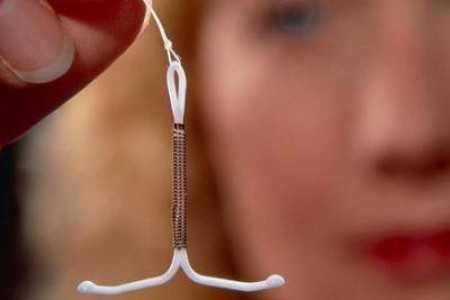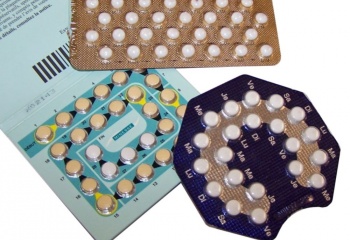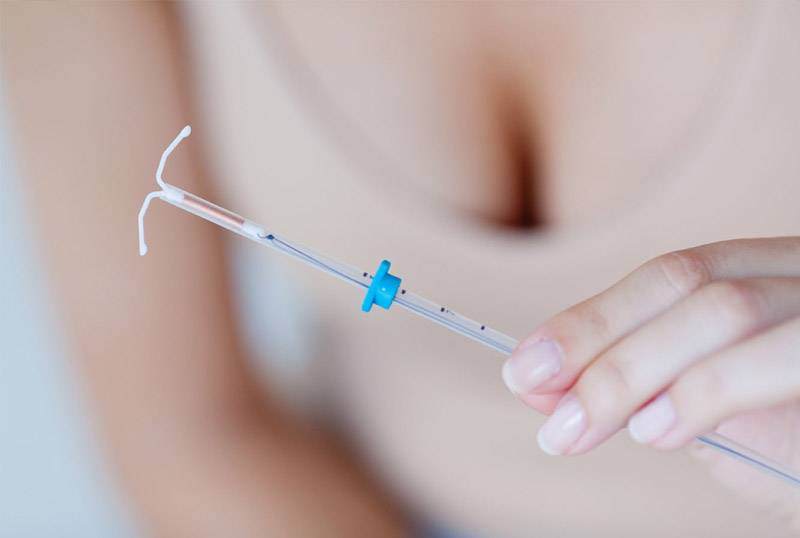When women appear in life serious relationship and a reliable partner, and the birth of a child is not planned in the near future, the question arises of safe and reliable contraception.
Among modern methods The most effective contraceptives are hormonal contraceptive pills and intrauterine system (spiral). So, let's look at the characteristics of these methods and try to figure out which is better, birth control pills or a spiral.
Prevention of migraine with aura
If the migraine is with neurological limitations, such as impaired sensory perceptions, the classic combination pills are absolutely contraindicated. This means that they should not be taken because these women have a significantly higher risk of strokes.
Contraception for menstrual migraine without aura
On the other hand, with menstrual migraine without aura, classic combination pills with estrogens and progestins are possible. The drop in hormones in the break of the pills drops out and hence the migraine attacks. Alternatives are also pure gestagen tablets, which are taken everywhere without tablets.
How contraceptive methods work
The contraceptive effect of hormonal pills is based on the prevention of ovulation, due to which the maturation of the egg does not stop, and pregnancy does not occur. Cervical mucus also thickens, and this prevents spermatozoa from penetrating into its cavity.
The spiral, being inside the uterus, causes a reaction of its inner layer, which consists in the rejection of a fertilized egg. This changes the peristalsis of the fallopian tubes and the ability of spermatozoa to pass through the uterine cavity.
What else needs to be considered?
All of the previously mentioned hormone-free alternatives are also possible for menstrual migraine without aura. If a headache first attacks the use of the tablet, possibly with neurological symptoms, the drug should be discontinued in any case, as well as neurological and possibly ophthalmic brightening. Smoking increases headaches and migraines and greatly increases the risk of stroke. We can urgently appeal to all women to quit smoking.
Of course, we would be happy to advise you in a personal conversation. Small pieces of plastic that release hormones and, as an alternative to the pill, prevent pregnancy in this way have been around for a long time: like rods in the upper arm or hormone coils. In February, a plastic ring appears on the market, which is preparing for anti-pill and cat-fighting competitions.
Advantages and disadvantages of contraceptives
Benefits of using hormonal birth control
- Protect against pregnancy by 98-99.7%.
- Regulate the menstrual cycle, making critical days painless and with less blood loss.
- The start of using the method does not require medical intervention.
- You can stop using the method at any time.
- The duration of the use of tablets is not limited.
- Improve skin condition.
- Reduce the risk of endometriosis and cancer of the genital area.
- Prevent ectopic pregnancy.
Spiral Benefits

It is four millimeters narrow and elastic. It is based on the hormones ethinylestradiol and etonogestrel, which penetrate the bloodstream through the vaginal mucosa and suppress ovulation. Not only is the daily memory eliminated, but the protection against vomiting is also reduced. A woman can use it like a tampon after squeezing the ring with her fingers.
After three weeks of wearing, it is removed, and then an irrevocable week in which bleeding occurs. Direct delivery to the blood requires fewer hormones, especially in terms of estrogen content. Side effects such as nausea, breast tenderness, and headache were lower, and bleeding disorders were 4.4 percent lower than what happens with the pill. Five percent of study participants experienced mild vaginal irritation and decomposition. In terms of safety, the ring is right up there with modern micropills.
- Contraceptive efficiency 99.4%.
- Long warning unwanted pregnancy(up to 5 years).
- Does not interact with drugs.
- There is no systemic effect on the body.
- No need to buy every month.
- Relative cheapness.
Negative aspects of the use of hormonal contraceptives
- The need to take daily pills.
- Possibility of temporary side effects (nausea, heaviness in mammary glands, smearing discharge), which disappear after 60-90 days.
- Increased risk of thrombosis and complications associated with this pathology.
- Changes in mood and sex drive.
- fluctuations in body weight.
Disadvantages of using a spiral
- Only a doctor in a medical institution can administer and remove the drug.
- Every month you need to independently control the threads of the spiral.
- During the first months of use, menstrual bleeding may increase.
- The spiral can fall out on its own.
- The risk of ectopic pregnancy and complications in case of infection with sexually transmitted infections increases.
Contraindications to the use of methods

In terms of ease of maintenance and wearing, the ring has so far received good marks, only a few women said they felt it in intimate situations, and were slightly more likely to report it to their partners. It is possible to remove the ring for a short time. But then you have to remember to use it again after three hours. "Nuwaring is a good method for women who do not want to think about pills every day and have an irregular rhythm of life," sums up gynecologist Carmen Jacoby from Hannover, along with her impressions.
In a retrospective of contraceptive innovations in recent years, it comes to very different estimates. This will be kind of a rather high price around 350 euros. But it also often led to the detection and disruption of the cycle by the progestogen containing the rod. Bleeding problems like these often trigger a three-month injection.
Hormonal contraceptives cannot be used by nursing mothers, women with bleeding disorders, thrombosis, severe liver disease, breast cancer.
The coil should not be placed in women with genital tract infections, congenital anomalies, or benign tumors uterus, with tuberculosis of the pelvic organs and with diseases of the heart valves in the active phase.
And since re-ovulation can be delayed here after stopping, this path is more likely something for older women who already have children. So a pure Mirena coil is much better: "Satisfaction is very high, women have less bleeding, sometimes not and they are rated as very positive that you have to think about anything." Unlike all other methods mentioned, the hormone acts only directly in the uterus, does not play a significant role in blood circulation. However, those who are still looking for another method: the next drug is already a hormonal stain this year for approval.
Who can use
Hormonal contraceptives can be used by all women of reproductive age. More often, doctors prescribe them to young nulliparous women.
Rules for the use of contraceptives
The spiral is introduced only by a doctor, you only need to periodically monitor the position of its threads and do not forget to come to a specialist at the end of the contraceptive's validity. On the issue of the introduction of a spiral, you need to contact a gynecologist in the first 12 days after the start of menstruation. It is also possible to start using the remedy on any day of the cycle that is convenient for you, if it is known for sure that you are not pregnant.
Danish study: Hormones in contraceptives, such as the pill and the spiral, easily increase the risk of breast cancer. This is a small but statistically significant difference, which Danish scientists report to Line Mörch of the University of Copenhagen in the New England Journal of Medicine. However, the result is confirmed by the abundance of analyzed data: the fates of 1.8 million Danes, at the beginning of 15-49 years, were observed for almost eleven years.
The risk has already emerged in small studies
Overview of various contraceptives
You have a new partner. Then it is logical that you are dealing with contraceptives. What form of contraception do you choose? The offer is incredibly large, which doesn't make it any easier. Pill, spiral or natural method? The pill contains hormones that prevent ovulation and make the uterus unsuitable for pregnancy. Thus, no fertilization can take place. There are pills containing both estrogens and progestins. There are also single progestins.Efficiency birth control pills directly depends on their regular use. You will need to take one tablet at approximately the same time each day. Forgetfulness in this case can threaten the appearance of an unwanted pregnancy.
The first tablet of a package containing 21 tablets is taken on the first day of menstruation and continued until the end of the blister. Then they take a week break, during which menstruation occurs, and start the next pack. If there are 28 tablets in the blister, then after it ends, immediately start a new one.
In most cases, you take the pill for three weeks and then take a week off. During this break week, you get your period. There are also pills that need to be taken continuously. In this case, there is no week break, but most often bleeding occurs in the fourth week of the cycle.
Advantages of the tablet: easy to use, very reliable, gives predictable and easy menstruation. With most pills, you can also easily move your periods. Disadvantages of the pill: must be taken daily and contain hormones that can cause side effects.
Which method of contraception to choose
First, address this question to a competent gynecologist. The doctor knows what features of the use of contraceptives should be paid attention to in your case. It would be useful to undergo an examination before using the method.
Rules for the use of contraceptives
The coil is a small, anchored object that is inserted into the uterus. There are two varieties: copper coils and hormonal coils. The copper coil works without hormones. The copper wire makes the sperm inactive and thus prevents pregnancy. The hormonal spiral acts on the basis of the progestogen. A small amount of this hormone is constantly secreted into the uterine cavity. The spiral provides protection against pregnancy for five to ten years.
The benefits of the spiral: You don't have to think about contraception for years. The copper coil is also hormone-free. Coil Disadvantages: Inserting a coil can be painful and must be done by a doctor. With the help of a spiral, menstruation cannot be delayed. In addition, the period may be irregular or absent.
Secondly, according to the reviews of women who have tried and hormonal way contraception, and the spiral, there is no unambiguous opinion about which method turned out to be the best. Supporters of hormonal pills are not satisfied with the abortive mechanism of action intrauterine system and the very fact of the presence of a foreign body in the uterus.
And women using the spiral are worried about possible side effects from hormones and the relatively high cost of pills. This proves once again that the best method is the one that suits you.
Once in the vagina, the ring gradually releases hormones. These hormones ensure the absence of ovulation and also make the uterus unsuitable for fertilization. After three weeks, you can remove the ring and it is followed by a week off in which the bleeding starts.
After a week off, bring a new ring. Inserting and removing rings is also very simple. With the help of this contraceptive you can postpone your period. This contraceptive works on the basis of hormones that are gradually released from the patch to the skin. The patch contains enough hormones for a week. They put out a new patch every week. Three weeks later, a week break follows, in which bleeding begins. After that, you will apply new plaster again.
Pregnancy is not always planned and desired. Perhaps a woman already has children or she simply does not want them because of her beliefs, the reasons may be different and this is a personal matter for each adult. But which contraceptive is still better? Oral or vaginal.
What is better, a spiral or birth control pills
If a woman categorically does not want to have more children, she should protect herself and do not forget that pregnancy is not a kitten, you will have to answer for it. This means that the process of sexual life should be controlled not only by the mind, but also with the help of medicine.Spiral.
This is a special device, which consists of copper and plastic (more expensive models are made of titanium and silicone). It is a T-shape, and it is installed on the 5-6th day after menstruation. It prevents the fertilized egg from attaching to the wall of the uterus, reduces the viability of the egg, and also prevents the zygote from moving along the walls of the uterus. It can be clarified that it is possible to get pregnant with a spiral, but this is one case out of a hundred. Therefore, this method of protection is quite reliable, except for the presence of a foreign body inside the body, and besides, doctors say that after removing the spiral, a woman cannot become pregnant for a very long time, since the vital activity of the egg is very low. 
Oral contraceptives.
These are ordinary pills that have a hormonal composition. Its functions include:
Hormone Patch Benefits: You don't have to think about contraception for a whole week. With the help of plaster, menstruation can be easily turned off or postponed. Disadvantages of Hormonal Correction: The patch contains hormones that can cause side effects. Also, the patch can sometimes lose its adhesive power, causing it to fall off.
Intrauterine device - effectiveness
A three-month syringe is an injection of progestins injected by a doctor under the skin or into a muscle. They are then protected for three months from pregnancy. Usually, this three-month syringe is given only if there is no other form of contraception available. The reason for this is an increased risk of osteoporosis.
- suppression of the ovulatory period.
- thickening of the mucous mass in the vagina, which does not allow sperm to pass through.
- inhibit sperm motility.
- liquefy the lining of the uterus, so the egg cannot attach to it.
 Results
Results
According to the statistics of the survey and medical observations - the risk of becoming pregnant when taking oral contraceptives much higher than when using a spiral. When using a spiral, it can be:
3 Month Syringe Benefits: Suitable for women who cannot or do not want to use estrogen. You do not need to think about contraception for thirteen weeks. Disadvantages of a three-month syringe: You have to see a doctor every three months to get a syringe. The hormones in the 3 month syringe can cause side effects. In addition, it is required that hormones disappear from the body. Therefore, you cannot get pregnant directly if you stop the injection. In addition, menstruation cannot be moved.
On the contrary, it may appear irregularly or stay away. The hormonal rod protects you from pregnancy for three years. A barbell is placed in the upper arm using local anesthesia and a type of hypodermic needle and placed directly under the skin. The rod then continuously releases a small dose of progestogens into the blood. It cannot cause pregnancy. After three years, the stick is removed and you can get new chopsticks if you wish.
- 70% of women after removing or installing a spiral began to complain about:
- discomfort in the pelvic area.
- copious secretions.
- inability to get pregnant if desired for a long time.
- cervical corrosion.
- inflammation of the ovaries.
- apoplexy (rupture) of the ovaries.
- possible oncology.

Naturally, this does not happen to everyone, these are just brief statistics. In any case, it is always necessary to pass tests, examination and doctor's recommendations.
When taking oral contraceptives, a hormonal conflict can occur, which is fraught with:
Benefits of the hormonal rod: You don't have to worry about contraception for three years. Also suitable for women who cannot tolerate or do not want to use estrogens. Disadvantages of the hormonal rod: implantation must be performed by a doctor. In addition, hormones can cause side effects. Menstruation may become irregular, heavy, or completely absent. You cannot move your period.
If you are unwilling or unable to take hormones, you can also choose a natural method of contraception. The temperature method is an old and commonly used drug-free method of preventing pregnancy. With this method, you must take your body temperature daily. During the fertile period, the basal body temperature is slightly higher than on the remaining days of the cycle. If you don't have intercourse or additional contraception these days, you won't get pregnant. Currently reliable, temperature-based measurements determine your fertile days.
- an increase in body weight.
- constant irritability.
- selection.
- candidiasis (thrush).
- dryness in the intimate area.
- headaches.
